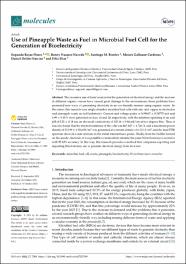| dc.contributor.author | Rojas-Flores, Segundo | es_ES |
| dc.contributor.author | Nazario-Naveda, Renny | es_ES |
| dc.contributor.author | Benites, Santiago M. | es_ES |
| dc.contributor.author | Gallozzo-Cardenas, Moisés | es_ES |
| dc.contributor.author | Delfín-Narciso, Daniel | es_ES |
| dc.contributor.author | Díaz, Félix | es_ES |
| dc.date.accessioned | 2023-02-24T16:48:54Z | |
| dc.date.available | 2023-02-24T16:48:54Z | |
| dc.date.issued | 2022-10-31 | |
| dc.identifier.uri | https://hdl.handle.net/20.500.13053/7901 | |
| dc.description.abstract | The excessive use of fossil sources for the generation of electrical energy and the increase in different organic wastes have caused great damage to the environment; these problems have promoted new ways of generating electricity in an eco-friendly manner using organic waste. In this sense, this research uses single-chamber microbial fuel cells with zinc and copper as electrodes and pineapple waste as fuel (substrate). Current and voltage peaks of 4.95667 ± 0.54775 mA and 0.99 ± 0.03 V were generated on days 16 and 20, respectively, with the substrate operating at an acid pH of 5.21 ± 0.18 and an electrical conductivity of 145.16 ± 9.86 mS/cm at two degrees Brix. Thus, it was also found that the internal resistance of the cells was 865.845 ± 4.726 Ω, and a maximum power density of 513.99 ± 6.54 mW/m2 was generated at a current density of 6.123 A/m2, and the final FTIR spectrum showed a clear decrease in the initial transmittance peaks. Finally, from the biofilm formed on the anodic electrode, it was possible to molecularly identify the yeast Wickerhamomyces anomalus with 99.82% accuracy. In this way, this research provides a method that companies exporting and importing this fruit may use to generate electrical energy from its waste. | es_ES |
| dc.format | application/pdf | es_ES |
| dc.language.iso | eng | es_ES |
| dc.publisher | MDPI | es_ES |
| dc.rights | info:eu-repo/semantics/openAccess | es_ES |
| dc.rights.uri | https://creativecommons.org/licenses/by/4.0/ | es_ES |
| dc.subject | microbial fuel cell; waste; pineapple; bioelectricity; Wickerhamomyces anomalus | es_ES |
| dc.title | Use of Pineapple Waste as Fuel in Microbial Fuel Cell for the Generation of Bioelectricity | es_ES |
| dc.title.alternative | Use of Pineapple Waste as Fuel in Microbial Fuel Cell for the Generation of Bioelectricity | es_ES |
| dc.type | info:eu-repo/semantics/article | es_ES |
| dc.identifier.doi | https://doi.org/10.3390/molecules27217389 | es_ES |
| dc.type.version | info:eu-repo/semantics/publishedVersion | es_ES |
| dc.publisher.country | US | es_ES |
| dc.subject.ocde | http://purl.org/pe-repo/ocde/ford#3.03.00 | es_ES |


